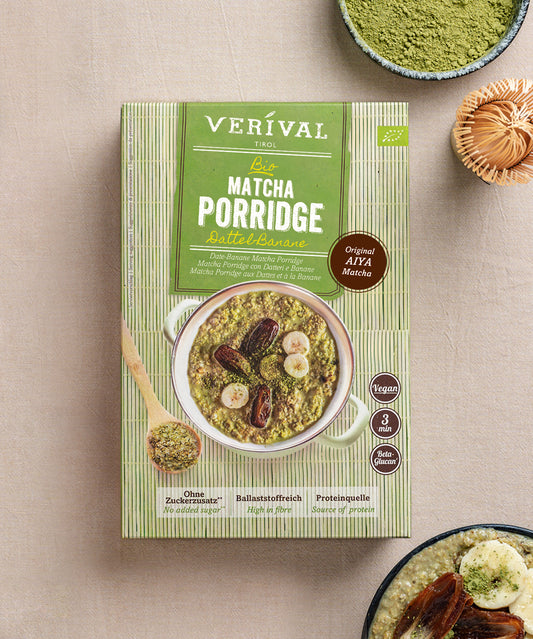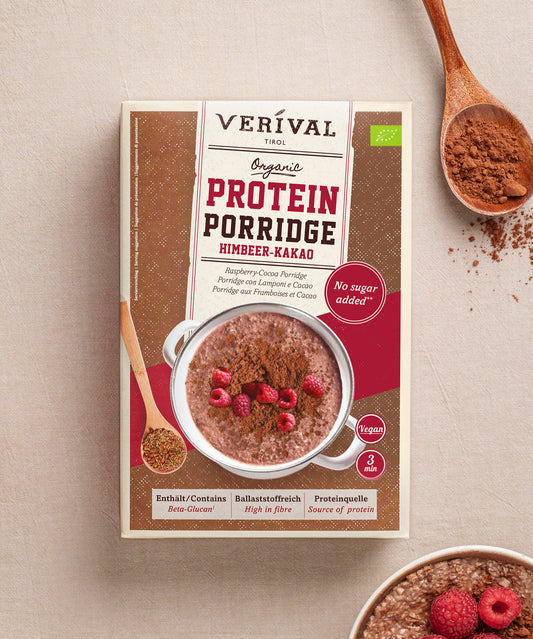If your stomach rebels quickly in the morning, you need a breakfast that nourishes you but doesn't weigh you down. Heartburn, reflux, bloating or an upset stomach can ruin your whole day. The good news is that there are simple ways to counteract this. The key lies in choosing and preparing your food wisely. In this article, you will learn what makes a stomach-friendly breakfast, which ingredients are best to avoid – and which ones are really good for you. With practical recipe ideas, tips and background information, you can start your day relaxed and symptom-free.
Discover and celebrate the entire Verival breakfast range here!
What exactly is heartburn?
Heartburn is one of the most common stomach problems – and can ruin even the healthiest breakfast. It manifests itself as a burning sensation behind the breastbone, often accompanied by acid reflux, a lump in the throat or even coughing. Some people only experience the burning sensation occasionally, others almost daily – especially in the morning on an empty stomach or immediately after eating.
Heartburn is not a coincidence
The cause is almost always the reflux of stomach acid into the oesophagus. Medically, this is called gastroesophageal reflux. The lining of the oesophagus is not designed to come into contact with stomach acid – it becomes irritated, inflamed and causes the typical burning sensation.
Why the morning is critical
Many people notice heartburn especially in the morning. This is because the stomach is empty overnight and more sensitive to stimuli. If you drink coffee, eat citrus fruits or start the day with fatty foods immediately after getting up, this can overwhelm the stomach and trigger reflux. That's why it's so important to start the day gently – with foods that soothe rather than irritate.
How does heartburn actually develop?
Heartburn occurs when stomach acid rises from the stomach into the oesophagus. This sounds harmless, but it is pure stress for the body. The lining of the oesophagus is not designed to come into contact with acid – it reacts immediately with irritation and inflammation.
The sphincter muscle as a weak point
At the junction between the stomach and the oesophagus is the lower oesophageal sphincter, a ring-shaped muscle that acts like a valve. It should only open when food comes from above. However, in many people, it does not close properly. As a result, stomach acid can flow back, especially when the stomach is full or under pressure, for example due to poor diet, stress or eating late.
These factors promote reflux
The main causes include:
- fatty or very acidic foods
- excessive coffee consumption
- alcohol
- nicotine
- stress and nervousness
- large meals
- eating late or in a hurry
Certain medications, poor posture or being overweight can also contribute to reflux.
What you eat and how you eat is crucial – especially in the morning. Starting the day with the wrong breakfast can cause heartburn before you even leave the house.
What is a stomach-friendly breakfast?
A stomach-friendly breakfast ensures that your digestive system remains calm, your stomach is not overworked and you start the day without irritation or burning sensations. It's not just about ‘healthy’ ingredients, but above all about how well they are tolerated by your sensitive stomach.
Gentle on the stomach lining
A good breakfast for sensitive stomachs is warm or at room temperature, low in acid and free from irritants such as coffee or citrus fruits. It should be as alkaline or neutral as possible and contain foods that have a soothing effect on the stomach lining, such as oats, bananas or cooked vegetables. Volume also plays a role: too large a portion in the morning overloads your stomach and promotes reflux.
Slow carbohydrates & fibre
Complex carbohydrates (such as those found in oatmeal or millet) give you energy without causing sharp fluctuations in blood sugar levels. They stay in the stomach longer without overloading it. Fibre promotes regular digestion and prevents bloating. Important: it is best to avoid coarse, hard-to-digest fibre (such as that found in raw muesli).
Plant-based milk instead of cow's milk
Many people with sensitive stomachs do not tolerate cow's milk well in the morning – it can promote acidity and flatulence. Mild plant-based alternatives such as oat, almond or rice milk (unsweetened) are better. These are soothing and easy to digest.
A stomach-friendly breakfast provides energy, keeps you feeling full and leaves you with a good gut feeling – without any burning sensations.
These foods are particularly easy to digest at breakfast
A sensitive digestive system needs rest, warmth and nutrients in the morning – not irritants or aggressive combinations. The right choice of foods can make the difference between a relaxed start to the day and hours of discomfort.
1. Oatmeal – the breakfast classic
Oatmeal is soft, filling and rich in soluble fibre. It has anti-inflammatory properties, binds excess stomach acid and promotes regular digestion. It is best prepared as warm porridge with water or plant-based milk. This allows its mucus-forming, soothing effect to be particularly effective.
2. Ripe bananas – mild, sweet and soothing
Ripe bananas (with brown spots) provide quick energy, are slightly alkaline and very gentle on the stomach. Their soft consistency is easy on the stomach lining, and their natural sugar provides energy without overstimulation. They are perfect in porridge or simply on their own with a little oat drink.
3. Cooked millet or rice
Millet is alkaline, gluten-free and extremely easy to digest. As a breakfast porridge (e.g. millet porridge) with steamed apple or a little cinnamon, it is a real alternative to oats. Cooked rice with a spoonful of almond butter also works well as a light breakfast.
4. Mild fruit – preferably steamed
Not all fruit is suitable. The following are easily digestible:
- Apples (peeled and lightly steamed)
- Pears (soft and ripe)
- Blueberries (gentle on the stomach and antioxidant)
- Steamed fruit is better than raw fruit because it contains less acid and does not stimulate digestion unnecessarily.
5. Plant-based milk – the gentle base
Oat milk, almond milk or rice milk (unsweetened) are ideal for cooking porridge or as a drink. They are easy on the stomach, alkaline and contain no lactose or animal protein, which is often difficult to digest.
Verival muesli with no added sugar – try it now
What you should avoid if you have a sensitive stomach in the morning
Your stomach is particularly sensitive in the morning. If you eat the wrong foods straight after waking up, you can provoke heartburn, nausea or bloating. Many common breakfast habits are real acid traps.
1. Coffee on an empty stomach – the irritant
Coffee is part of many people's morning routine – but for a sensitive stomach, it is poison. It strongly stimulates acid production, irritates the mucous membranes and promotes reflux into the oesophagus. Coffee is particularly critical on an empty stomach. If you don't want to cut it out completely, then at least wait until after breakfast – and choose a mild or decaffeinated variety if possible.
2. Citrus fruits & fruit juices – far too acidic
Oranges, grapefruit and multivitamin juices may seem refreshing, but they contain a significant amount of fruit acid. This irritates the stomach lining and can cause heartburn – especially on an empty stomach. Even freshly squeezed juice is not always easily digestible. Better options include mild, steamed fruit or ripe bananas.
3. Wheat rolls, croissants and sweet pastries
Yeast dough, white flour, lots of fat and sugar – these are a strain on any stomach, especially in the morning. Croissants, toast with jam or sweet pastries cause blood sugar levels to skyrocket, contain hardly any fibre and can promote fermentation and acidity. Oatmeal, millet or cooked whole grain rice are better options.
4. Dairy products – often underestimated
Yoghurt, quark and milk may seem light, but they can cause flatulence or irritation in sensitive people. Cow's milk contains lactose and animal protein, which can be difficult to digest, especially in the morning. Plant-based alternatives are often better tolerated.
5. Raw food in the morning – too much for a start
Raw vegetables or uncooked muesli with hard seeds may sound healthy, but they are too coarse for a sensitive stomach. They stimulate digestion too much and keep the stomach busy for too long, which promotes reflux and discomfort. A warm, soft breakfast is a better choice here.
Oatmeal as a superfood for heartburn
Oatmeal isn't just a boring breakfast filler – it's one of the most effective natural remedies for heartburn and sensitive stomachs. Simple, inexpensive, versatile and nutritious: hardly any other food offers so many benefits at once. If you regularly struggle with reflux or stomach pressure, you should make oatmeal a regular part of your morning meal plan.
Why oatmeal calms your stomach
Oatmeal contains beta-glucans – soluble fibre that swells in the stomach and forms a gel-like protective film on the mucous membranes. This film acts as a barrier over the irritated stomach lining and protects it from further acid exposure. At the same time, oatmeal binds excess stomach acid and reduces burning in a natural way.
It also has a slightly alkaline effect, which balances the acid-base balance and relaxes the stomach. You will quickly notice that oatmeal does not lie heavy in the stomach, makes you feel pleasantly full and keeps your blood sugar stable – without any irritation.
Variety that tastes good to your stomach
Whether classic porridge, overnight oats or oatmeal with steamed fruit, oatmeal can be customised to suit your taste. You can combine it with mild fruits such as banana or apple, boil it with oat milk or even prepare it in a savoury dish with steamed vegetables. Important: look for tender oats and avoid instant mixes with added sugar, flavourings or dried fruit – these can irritate the stomach.
The perfect start to the day
Warm porridge is just the thing in the morning: it's easy on the digestive tract, gives you energy and protects your stomach throughout the morning. If you often wake up with a burning sensation or feeling of fullness in the morning, try a simple oatmeal breakfast for a week. You will quickly notice how much your stomach benefits from it.
5 breakfast ideas for sensitive stomachs – simple, gentle and filling
If you struggle with a sensitive stomach in the morning, you need more than just a ‘healthy breakfast’. You need a combination of mild ingredients, gentle preparation and soothing effects. These five breakfast ideas have been developed precisely for this purpose – they calm, fill you up and provide energy without stressing your digestion.
1. Classic oat porridge with banana & flaxseed
Why it works:
Oatmeal binds stomach acid and protects the mucous membranes. Bananas provide alkaline energy, while flaxseed gently stimulates digestion.
Ingredients (for 1 serving):
- 5 tablespoons of soft oatmeal
- 200 ml of unsweetened oat milk or water
- 1 ripe banana
- 1 teaspoon of ground flaxseed
Preparation:
Heat the oat flakes with the oat milk in a small saucepan. Simmer for about 5 minutes, stirring constantly, until a creamy porridge forms. Slice the banana and either cook it directly with the porridge (for a sweeter taste) or add it raw on top. Finally, stir in the flaxseed and let it soak for 1–2 minutes.
Tip
If you need it a little sweeter, add 1 teaspoon of rice malt or apple syrup – both are easier on the stomach than sugar or honey.
2. Millet porridge with apple compote & cinnamon
Why it works
Millet is gluten-free, alkaline and ideal for sensitive stomachs. Apple compote provides pectin, which has a calming effect. Cinnamon gently aids digestion.
Ingredients:
- 50 g golden millet
- 1 mild apple (e.g. Gala or Jonagold)
- 250 ml water or unsweetened plant milk
- 1 pinch of cinnamon
Preparation:
Wash the millet thoroughly, then cook in water or milk over a low heat for about 10–15 minutes until soft. In a separate pan, steam the peeled apple in a little water until soft. Purée or leave in pieces. Mix everything together, season with cinnamon and enjoy warm.
Tip
Millet is great for pre-cooking. You can also mix it with a little almond butter to make an overnight porridge.
3. Steamed pear with oat porridge & almond butter
Why it works
Pears are milder than apples, low in acidity and have a mild laxative effect – ideal for sluggish digestion. Almond butter provides healthy fats without irritation.
Ingredients:
- 3 tbsp soft oats
- 150 ml water or oat milk
- 1 ripe pear
- 1 tsp almond butter
Preparation:
Peel and core the pear and cut into small cubes. Gently steam in a little water until soft. Bring the oats to the boil with water and leave to soak for 3–5 minutes.
Fold in the soft pear and top with almond butter.
Tip:
If you can't tolerate almond butter, you can also use flaxseed oil or sesame butter – both are easy on the stomach.
4. Rice flake porridge with blueberries
Why it works:
Rice flakes are extremely easy to digest and therefore ideal for acute stomach complaints. Blueberries contain anthocyanins, which have anti-inflammatory properties.
Ingredients:
- 4 tbsp rice flakes
- 150 ml unsweetened plant milk
- A handful of blueberries (fresh or frozen, unsweetened)
Preparation
Stir the rice flakes into the milk, bring to the boil while stirring and simmer gently for 2–3 minutes. Add the blueberries at the end and heat briefly or add raw.
Tip
If using frozen berries, defrost them slightly beforehand or add them during cooking. Avoid highly acidic berries such as currants.
5. Hearty carrot and oat porridge with turmeric
Why it works:
Carrots soothe the mucous membranes, oatmeal regulates digestion. Turmeric has anti-inflammatory properties – but only in small amounts.
Ingredients:
- 5 tbsp soft oatmeal
- 1 small carrot, finely grated
- 1 pinch of turmeric
- 200 ml water or oat drink
- 1 tsp flaxseed oil (after cooking)
Preparation:
Finely grate the carrot and heat in a saucepan with the oatmeal and liquid. Simmer for about 5–6 minutes over medium heat, adding the turmeric at the end. Remove from the heat and stir in the flaxseed oil.
Tip
This recipe is ideal for anyone who doesn't want to eat sweet things in the morning. It can also be varied with steamed fennel or courgette.
These breakfasts provide you with energy without irritating your stomach – and without any complicated ingredients. They are easy to prepare, vary and adapt to your needs.
Verival Porridge – the classic breakfast!
Conclusion: breakfast for sensitive stomachs
A sensitive stomach doesn't have to be a permanent problem – especially in the morning. With the right foods, the right preparation and a little planning, you can specifically avoid complaints such as heartburn, bloating or irritation. Oatmeal, millet, steamed fruit and mild plant-based milk are your allies. Simply avoid aggressive sources of acid, coffee on an empty stomach and hard-to-digest raw foods – your stomach will thank you for it. Start gently, start smart – and you'll start better.
























